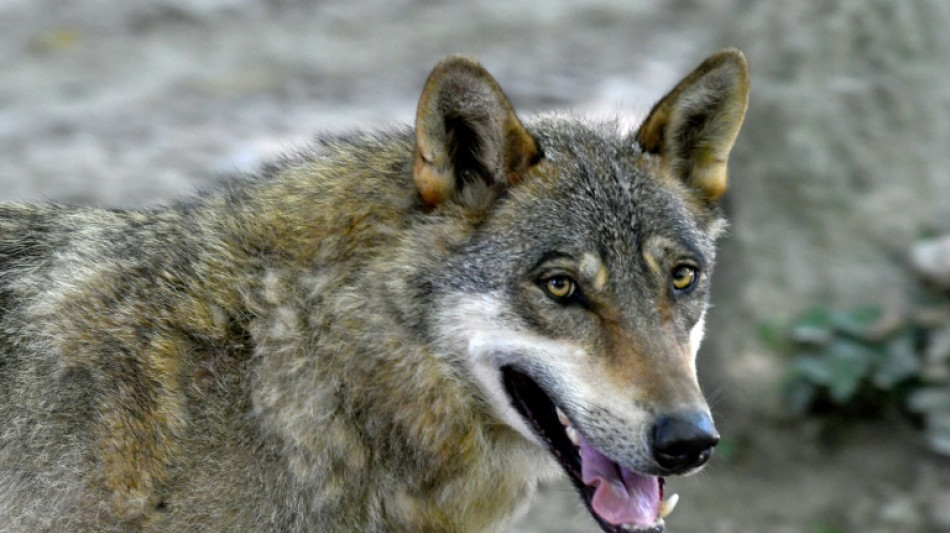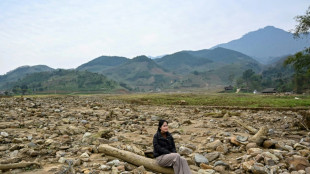
-
 Vietnam village starts over with climate defences after landslide
Vietnam village starts over with climate defences after landslide
-
'Happiness, love' at Moonie mass wedding after Japanese court blow

-
 Veteran Chinese astronaut to lead fresh crew to space station
Veteran Chinese astronaut to lead fresh crew to space station
-
Pilgrims gather as Pope Francis begins lying in state

-
 Asian markets rally as Trump comments ease Fed, China trade fears
Asian markets rally as Trump comments ease Fed, China trade fears
-
Saudi 'city of roses' offers fragrant reminder of desert's beauty

-
 Trump says won't fire Fed chief, signals China tariffs will come down
Trump says won't fire Fed chief, signals China tariffs will come down
-
India hunts gunmen who massacred 26 in Kashmir tourist hotspot

-
 'No one else will': Sudan's journalists risk all to report the war
'No one else will': Sudan's journalists risk all to report the war
-
UK hosts new round of Ukraine talks

-
 Trial testimony reveals OpenAI interest in Chrome: reports
Trial testimony reveals OpenAI interest in Chrome: reports
-
Tokyo's newest art star: one-year-old Thumbelina

-
 Ronaldo hunts Asian Champions League glory in Saudi-hosted finals
Ronaldo hunts Asian Champions League glory in Saudi-hosted finals
-
Scientists sound alarm as Trump reshapes US research landscape

-
 Trump's return boosts Israel's pro-settlement right: experts
Trump's return boosts Israel's pro-settlement right: experts
-
Trump solo: first lady, children out of frame in new term

-
 Climate watchers fret over Trump's cut to sciences
Climate watchers fret over Trump's cut to sciences
-
Moving fast and breaking everything: Musk's rampage through US govt

-
 'Everyday attack' - Trans youth coming of age in Trump's America
'Everyday attack' - Trans youth coming of age in Trump's America
-
A stadium and a jersey for Argentina's 'Captain' Francis

-
 New Trump task force vows to root out 'anti-Christian bias'
New Trump task force vows to root out 'anti-Christian bias'
-
Auto Shanghai showcases new EV era despite tariff speedbumps

-
 Trump's administration moves to scrap artificial food dyes
Trump's administration moves to scrap artificial food dyes
-
Musk to reduce White House role as Tesla profits plunge

-
 US official backs off promise to solve cause of autism by September
US official backs off promise to solve cause of autism by September
-
Guardiola joy as Man City go third after dramatic win over Villa

-
 Trump says has 'no intention' of firing Fed chief
Trump says has 'no intention' of firing Fed chief
-
Jury finds New York Times did not libel Sarah Palin

-
 UN appoints envoy to assess aid for Palestinians
UN appoints envoy to assess aid for Palestinians
-
Celtics star Tatum 'doubtful' for game two against Magic

-
 Former England star Flintoff reveals mental battle after car crash
Former England star Flintoff reveals mental battle after car crash
-
Defending champion Korda chases first win of season at Chevron Championship

-
 Olmo fires Liga leaders Barca past Mallorca
Olmo fires Liga leaders Barca past Mallorca
-
Nunes strikes at the death as Man City sink Villa to boost top-five bid

-
 Tesla says profits plunge 71%, warns of 'changing political sentiment'
Tesla says profits plunge 71%, warns of 'changing political sentiment'
-
WHO announces 'significant' layoffs amid US funding cuts

-
 PSG draw with Nantes to stay unbeaten in Ligue 1
PSG draw with Nantes to stay unbeaten in Ligue 1
-
Trump's administration moves to ban artificial food dyes

-
 Gunmen kill dozens of civilians in Kashmir tourist hotspot
Gunmen kill dozens of civilians in Kashmir tourist hotspot
-
US Treasury chief expects China tariff impasse to de-escalate

-
 I.Coast opposition leader Thiam barred from presidential election
I.Coast opposition leader Thiam barred from presidential election
-
Top US court leans toward parents in case on LGBTQ books in schools

-
 At least 24 killed in Kashmir attack on tourists
At least 24 killed in Kashmir attack on tourists
-
Rahul powers Delhi to big win over Lucknow in IPL

-
 Colombian cycling star 'Lucho' Herrera denies murder conspiracy
Colombian cycling star 'Lucho' Herrera denies murder conspiracy
-
Trump, Zelensky to attend Pope Francis's funeral Saturday

-
 US State Department to cut positions, rights offices
US State Department to cut positions, rights offices
-
Ukraine ready for direct talks with Russia only after ceasefire: Zelensky

-
 Myanmar Catholics mourn pope who remembered their plight
Myanmar Catholics mourn pope who remembered their plight
-
Pope's Vatican 'family' pay tearful respects


Rapid development is main threat to big carnivores: study
Declines in populations of big carnivores like lions, tigers and wolves may be driven more by rapid human economic development than habitat loss or climate change, according to a new study Tuesday.
The researchers hope the findings could help to improve policies for protecting carnivore populations, which have been driven to the brink of extinction in many parts of the world.
The study found that faster economic development was linked to a quicker decline in carnivore populations.
"In the midst of rapid development, people appear to become less tolerant of carnivores, conflicts explode, and we suspect that incidences of poaching and persecution rocket," lead author Thomas Johnson said in a press release.
Some carnivores are poached for their meat or for the wildlife trade, while others like lions may be killed if they pose a threat to someone's livelihood -- such as their cattle -- or their life, Johnson told AFP.
"These human elements are actually having a far greater impact than the habitat loss elements," Johnson said.
Traditionally, habitat loss has been considered the primary threat to carnivore populations, but the researchers said that was "dwarfed" by human development.
The study, published in Nature Communications, concluded that as human communities become wealthier and socioeconomic growth slows, carnivore populations can recover.
The authors said this was partly due to better habitat protection, but mainly because people start to care more about the animals and have less of a desire -- and need -- to kill them.
"What you want is this growth to slow before [the carnivore population] completely vanishes, so there's at least an opportunity to recover," Johnson said.
- Wolf rebound -
Grey wolf populations have already rebounded in Europe, growing 1,800 percent since the 1960s thanks to an improved quality of life and slower economic development on the continent, according to the researchers from the University of Reading.
That recovery is not only happening in protected parks but also in wild areas.
Brown bears and lynxes are also starting to recover in Europe, Johnson said, while tiger populations in India have similarly started to rebound.
But several parts of Africa did not support the overarching findings -- the continent has not seen rapid development but its carnivore populations have declined -- and Johnson said this may be because much of the population decline occurred decades ago under colonial regimes.
The findings present an inherent tension between prioritising human development versus protecting carnivores, and Johnson suggested that wealthier nations -- responsible for much of large carnivore decline -- could support less developed nations through targeted financial support.
This could include paying communities in biodiversity hotspots enough to earn a living, while promoting conservation.
"If you lock people into poverty, people will never live alongside biodiversity," Johnson said, adding that he hopes policy will move beyond treating carnivore loss as a narrow issue.
"My real hope is we start thinking about this as a socioeconomic problem, as well as an environmental problem."
The work looked at 50 species of carnivores in over 80 countries over the last 50 years.
Carnivore populations have seen dramatic declines globally in the last century, with lions and tigers absent from more than 90 percent of their historic range.
In the United Kingdom, many local carnivore species such as lynx, wolf and bear have already been hunted into extinction.
F.Pavlenko--BTB


